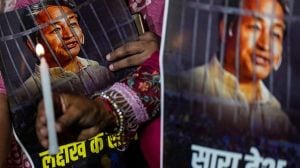‘The Abnormal is a Way of Life’
NIGHTS are usually out-of-bounds for any sort of socialising in Kashmir, so much so that even weddings take place during the day. So, when w...

NIGHTS are usually out-of-bounds for any sort of socialising in Kashmir, so much so that even weddings take place during the day. So, when we suggest a dinner-time meeting with eminent Kashmiri artist Masood Hussain, surprise is inevitable. ‘‘Late in the evening. Are you sure?’’ he asks.
After navigating dark, unlit streets, when we finally reach Masood’s house, we have to knock several times before the door opens. Understandable, for late-night knocks rarely bring good news in Kashmir. But once inside, it’s a different story: Hussain’s wife and two teenaged daughters have already laid out the dastarkhwan in the tiny room, which could double as a gallery. The room looks like a microcosm of Kashmir’s tragedy, a painting of the Shah-e-Hamdan shrine in the middle of dozens of relief pieces depicting the pain and trauma of a people who no longer control their lives.
As Masood’s wife, who runs a small business, ladles rice on place and passes around bowls of delicious wazwan, he talks of his latest works. ‘‘My works focus completely on the prevailing situation. You have to shut your eyes and close your ears, if you want to do something else here,’’ he says.
But what about possible repercussions, especially since his works are full of political statements? His hand freezes on the way to the mouth and, for a moment, he is completely lost in thought. The silence is broken by his daughter Sanna, 19. ‘‘I don’t know about him. But I am not scared anymore,’’ she says. ‘‘In the early days of militancy, when my father’s studio was gutted and he had to leave Kashmir for safety, I was really worried. I was just nine but I vividly remember every detail. He is an artist and art speaks silently. And I believe that people who react violently only listen to louder things. Thus any comment in art passes unnoticed.’’
In two days, Sanna will be off to Delhi, where she will study Botany at Gargi College. ‘‘I must say that life here is much more difficult for us than it was for our parents. At least he had fun in his youth. At least he can give vent to his feelings through his works. We have nothing to look forward to,’’ she says. ‘‘Frankly speaking, I feel lucky to be able to get out of this place, even though I will miss my family. At least I will be rid of this uncertainty.’’
Sanna recalls just one occasion in the past 12 years when she went out for a family dinner. ‘‘It was some two years ago. We had a dinner at Shamyana restaurant on the Dal Lake and we were home by 10-10.30 pm,’’ she remembers. She has never been out in the evening with her friends. ‘‘It is nothing unusual for us anymore. It might be abnormal for people living in freedom and peace but here it is a way of life. Evenings are compulsorily spent either in front of the television or in boring chats with siblings.’’
Sanna’s younger sister Mahvash is just 16 and beginning to combat thwarted ambitions. She wants to become a classical dancer, but cannot find a teacher. She loves to swim but ‘‘how can a girl dream of such a luxury in Kashmir where others determine what you need to do with your life.’’
Her sister joins in: ‘‘This is what irritates me the most here. People seem to be much more interested in what you wear or do than even in their own lives. If you dress up, it can land you in real trouble. Everywhere you go, people will stare and even ask uncomfortable questions.’’
Unlike most youngsters, the girls have never watched a film at a cinema in Kashmir. ‘‘I faintly remember going with my parents to watch Amitabh Bachchan’s Shahenshah some time in 1988,’’ Sanna says. ‘‘I am not a film fan, but for most people of our generation, our only window to cinema is television’’.
All this while, the parents listen silently. Then Masood says, ‘‘It is painful for parents to send their children away, but there are no opportunities here. Sanna wants to study Botany and we could not find a single course here. I am planning to send the other girl away from Kashmir too. Then (looking at his wife) we just have each other to worry about.’’
Apart from the general situation, Mrs Hussain is unhappy with the way her business is going. ‘‘Nobody is interested in buying anything,’’ she says. ‘‘My small linen shop is no longer profitable’’.
How do they finance the household in such circumstances? Masood teaches at the local Fine Arts College and also sells his works once in a while. Which brings us to the question: What do his daughters think of his work? ‘‘His latest works are like a mirror in front of you,’’ Sanna responds. ‘They vividly depict all our fears and desires, which we tend to hide deep within ourselves.’’
Outside, the darkness has grown intense but the chill factor has nothing to do with the temperature. As we bid goodbye, we can’t but see the strange calm on the faces of the girls — they had perhaps spoken their minds for the first time in years.





- 01
- 02
- 03
- 04
- 05


























